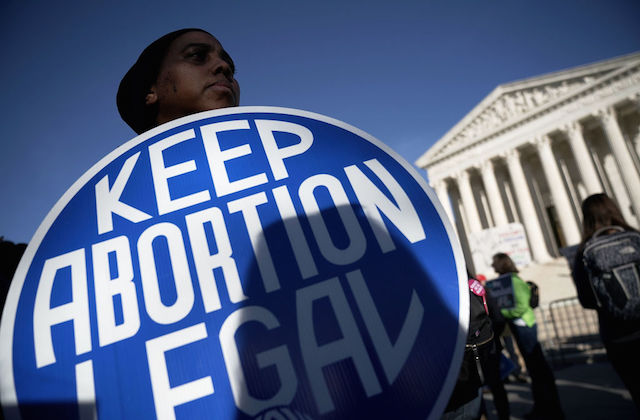Last week, The Wall Street Journal ran an op-ed, "Let’s Talk About The Black Abortion Rate," by journalist and Fox News commentator Jason Riley, in which he compared Black women getting abortions to "Black violent behavior." In response, a Black reproductive rights activist and doula wrote a piece that not only addresses the Journal story, but makes the connection between intersectionality, White supremacy and why abortion rights must be protected for Black women.
Published on July 17 by Rewire.News, “Black Women’s Abortions Are Not ‘Black-on-Black Crime’” was written by Yamani Hernandez. In it, she writes:
rnt
Black people who have abortions aren’t being forced to do so, and trying to coerce Black women into continuing their pregnancies or expanding families is advancing White supremacist notions about what Black women are here for. Why is it so offensive to imagine that every Black woman in America may not have the desire or means to have or expand their family? We have been coerced enough. Black liberation is not measured in numbers of Black births; it is measured by thriving, autonomous Black lives.
The piece details the many economic stresses that disproportionately affect Black communities and could negatively impact someone’s ability to raise a family. These, she writes, include “the wage gap, Black net worth, and what it would take for Black families to catch up to the generational wealth of White people. Many people can’t even afford an abortion because they can’t afford their rent.”
In addition, Hernandez notes that Black women often face health-related challenges that factor into the decision to have an abortion:
rnt
If Riley was truly concerned with the quality of life for the “Black population,” he would have noted in his piece issues like sexual violence and the fact that intimate partner violence is a leading cause of death of Black women. And the maternal health crisis, in which Black women are three to four times more likely to die while giving birth than white women—even Serena Williams nearly lost her life giving birth.
As Colorlines has previously reported, African-American maternal mortality rates are three to four times higher than White women’s.
Beyond health and socioeconomic realities, Hernandez stresses that there is a clear—and obvious—difference between crime and having a legal medical procedure:
rnt
Like many Black women, I sit at the intersections of race, gender, sexuality, ability and more. At 16, my friend Everton was shot in the head on the six-block walk from his house to my house. My mother and I launched a neighborhood-based anti-violence campaign in response, and my mother ran for alderman on an anti-violence platform. Three years later, I had an abortion while in college with the man I would later marry (and divorce). I’m clear that my choice to have an abortion was not murder, nor a crime; when there was a crime, I took action against it.
She ends the piece by examining numbers—statistics that prove that Black people remain committed to Black women’s reproductive rights when it comes to abortion:
rnt
Riley cites polling from 1973 to make his argument that Black people have historically been “less likely than Whites to support abortion.” But it’s 2018, and the polling from today is the polling that matters. Sixty-seven percent of Americans believe that Roe v. Wade should not be overturned, including 43 percent of Republican voters. Two-thirds (67 percent) of Black Americans believe that abortion should be legal in all or most cases. If Black civil rights groups are more supportive of reproductive rights than they were 40 years ago, as Riley suggests, it’s because the world and our analysis has evolved about the intersectional nature of oppression. His should too.
Read the entire article here.
